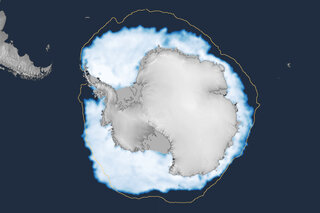When forecasters remove the observed trend from sea surface temperatures, the predicted heat wave area drops from 50 percent of the global ocean to 25 percent.
A much warmer than normal July is favored across the northern tier of the country, paired with boosted chances for a relatively dry July around the Great Lakes.
A new study finds that Atlantic Niño, the Atlantic counterpart of the Pacific El Niño, increases the formation of tropical cyclones off the coast of West Africa. The study is the first to investigate the links between Atlantic Niño/Niña and seasonal Atlantic tropical cyclone activity and the associated physical mechanisms.
Environmental observations indicate that summer burned areas in northern and central California have increased fivefold over 1996–2021 compared to 1971–1995. A new study finds that nearly all the observed increase over the past half-century is due to human-caused climate change.
A marine heatwave is a period of extreme ocean temperatures (90th percentile above normal temperatures). But scientists debate what constitutes “‘normal.” The baseline period used changes the definition.
An estimated 80 percent of Alaskans live in at-risk areas for wildfires, but those residents constitute a diverse public audience with varied information-seeking habits. New research examines how to reach that audience.
In the summer of 2021, wildfire haze from Arizona, California, and the Pacific Northwest shrouded the Denver region. Monsoon-driven summer thunderstorms that normally flush out stagnant air largely failed to materialize, allowing smog cooked under the summer sun in 90-degree heat to pool along the base of the foothills to the west.
Drought is one of the costliest and deadliest climate-related disasters in the United States. NOAA’s National Integrated Drought Information System and the University of Nebraska Medical Center have led the development of the first comprehensive assessment of drought and health.
Will El Niño push the planet to a new record-high temperature in 2023? Our guest blogger explains what past years tell us.
